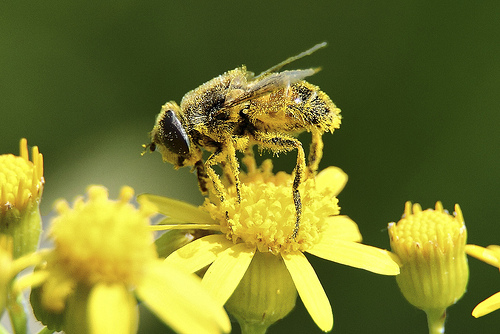There are those who say that giving bee pollen to children is irresponsible and should be avoided at all costs. Their concern is understandable, for severe allergic reactions to bee pollen have been recorded, but is their fear justified? Is it safe to give your child bee pollen as a nutritional supplement? Is using bee pollen for allergies a good idea?

Taking it Slow
The short answer to whether or not bee pollen is safe for children is “yes.” However, like any other food added into a child’s diet, bee pollen should not be added indiscriminately or without due consideration for the health risks, and there are health risks, the primary one of these being a possible allergic reaction.
While large amounts of bee pollen can trigger an allergic reaction, there are steps that you can take to ensure your child’s safety even while you are preparing them for the many health and nutritional benefits that bee pollen has to offer.
First, start adding bee pollen to your child’s diet in very small amounts. Begin with just one granule placed under their tongue. You can have them pretend that it is a game and see how long they can keep it there (hopefully until it dissolves). Once it has dissolved and there are no signs of a reaction or of sensitivity, then you can add a granule the next day. Continue to add granules each day until you have reached a teaspoon full, which is the recommended amount for children under 50 lbs. If your child is between 50-100 lbs continue to add granules until you reach 2 teaspoons full. If your child (usually teenagers) is over 100 lbs, continue to add granules until you reach the full adult dosage which is 1 tablespoon (or three teaspoons full).
If there is a reaction or signs of sensitivity such as difficulty breathing, breaking out in a rash or swollen lips and watery eyes, back track to the last dosage where there was no reaction and continue this as the “full dosage” for at least six months, at which time you can try adding granules again.
While it may sound like an unnecessary risk to expose a child to a product to which they show sensitivity, there has been enough research done to indicate that taking bee pollen regularly can actually help to alleviate allergy symptoms, including the allergy symptoms inherent to bees and pollens, which means that by ingesting the source of the allergen in small amounts, your child may actually build up an immunity.
Weighing the Benefits
Besides helping your child to build up an immunity to allergens, bee pollen has so many different kinds of health benefits that they actually outweigh the risks of taking the bee pollen as a nutritional supplement. These include helping the child to build up a resistance to health issues as well as helping to supplement their vitamin and mineral intake and help to bolster their immune system so that they do not catch every cold that comes along.
By treating the introduction of bee pollen into your child’s diet in a reasonable and responsible manner, you can see to it that your child reaps the benefits of bee pollen without being exposed to the risks of allergic reactions.
Joshua Kane writes about the health benefits of bee pollen, honey, royal jelly and propolis. If you would like to learn more about how to promote your health with honey bee products, click here to visit his website.
Bee Pollen And The Safety Of Your Child

